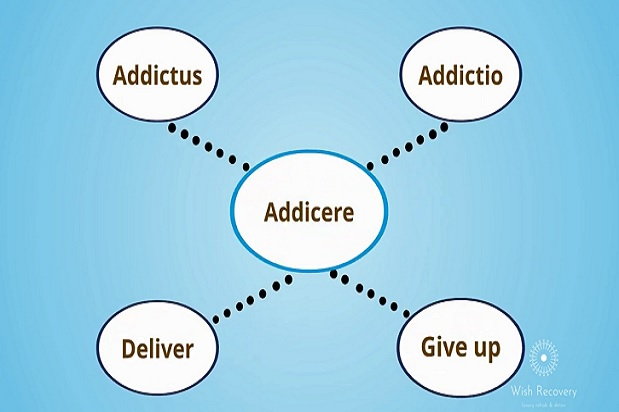The etymology of addiction has several connotations derived from its Latin roots, including devotion to a god, attachment, and captivity.
Bygone Eras, Mythical Origins, and the Present
In Roman law and the Middle Ages, a civil judicial officer would sentence a debtor to addiction and force them to work for a master to repay debts. As a result, the enslaved debtor or "addictus" was imprisoned by obligations they couldn't afford to repay. According to an ancient story, a freed slave, Addictus, wandered the countryside in shackles even after his master released him because he was so used to them that he didn't know what to do without them.
Interestingly, like Addictus, a person dealing with a substance or alcohol use disorder will often relapse after a period of sobriety. Relapse is usually a response to triggers (people, places, things). The recovering person is so used to drinking or getting high that they can no longer resist the cravings and temptations that attract familiarity, stemming from the neurological damage of addictive substances and the former behavior they were accustomed to throughout their addiction.
The word "addictus" is a derivative of the Latin word "addicere," which means "to surrender or deliver." The word "adicere," the English word "addiction," and other words like "dictation" and "dictionary" come from the Latin root word "dicere." The term "addicere" first appears in Plautus' plays from the late third and early second centuries BCE.
The reflexive use of "addicere" generally denotes self-destructive behavior. Gambling, drunkenness and binge eating are all behaviors that have the potential to "enslave" someone. However, “addicere’s” meaning was later expanded to include compulsory, enslaving pursuits of riches, celebrity and philosophy. For example, throughout the first century of the Common Era, the Stoic philosopher Seneca utilized "addicere" in his moral and philosophical works.
A "good addiction" is a phrase used to describe a habit with more benefits than disadvantages. Byproducts of "addicere" were positive in the early modern era because of their association with attachment and commitment. One example is a person's devotion to God. However, when the associations were to anything unhealthy or harmful, the word's derivatives started to carry negative implications.
The term "addiction" has characterized alcohol and drug consumption since the 19th century in its more common usage. The American Psychiatric Association removed it from the DSM-III in four different editions. There were no words in the medical vernacular to characterize nonsubstance addictions, such as online gaming disorder. Since its inclusion in the DSM-5, "behavioral" addiction has formal diagnostic recognition for the first time.
The Stigmatization of "Addiction"
While addiction is a terrible and debilitating affliction, it does not imply that the person with an addiction is morally or ethically depraved. The term "addiction" has been unfairly vilified. Yet, many gyms, shoe stores, lingerie stores and hair salons capitalize on the use of “addiction” as their brand’s moniker. It is also a well-known brand of men's underwear and motorcycle clothing. Some other examples of its commercialized application include archery and even a hot sauce firm.
If people with drug and alcohol issues are continually stigmatized and socially berated, they may be discouraged from getting treatment. Labels such as "addict" do little to mitigate the negative connotations of substance use and misuse. The first step toward reducing shame is using human-centered language. Employing words like "substance use disorder" rather than "substance abuse" may help with stigma. When successful stigma reduction strategies are employed, both addiction treatment facilities and their patients benefit.
Even while the term "addiction" has a comprehensive, evolutionary etymological history and now includes activities such as internet and sex addictions, the fact is that addiction is a terrible condition that many people cannot overcome without getting professional help. Nevertheless, recovering from a substance use disorder is possible, and this will never change.








